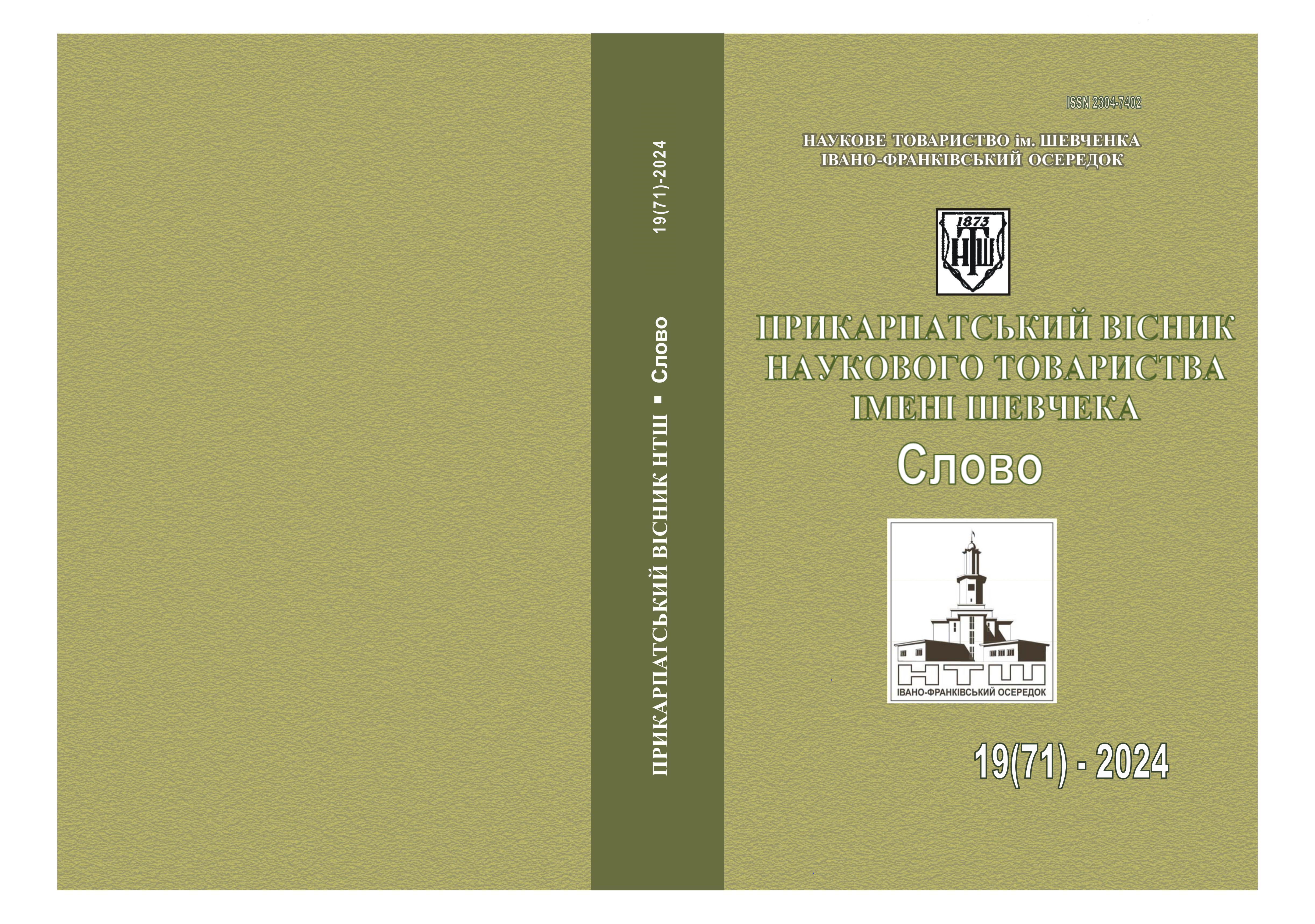SPECIFICS OF SOCIAL-CULTURAL AND COGNITIVE-MENTAL CONTENT OF THE CATEGORIES "INTELLIGENT" AND "INTELLIGENCE"AT THE BEGINNING OT THE XXST CENTURY: DISCOURSE ASPECT
DOI:
https://doi.org/10.31471/2304-7402-2024-19(71)-373-392Keywords:
semantic structure, discourse, intellectual, intelligence, cultural crisis, socio-cultural aspect.Abstract
Aim. The article is devoted to such conceptual categories as "intelligent" and "intelligence". In the history of our civilization, this conceptual structure is a rather late phenomenon. It was finally formed only in the 19th century. But over the past century and a half, it has undergone significant semantic, scriptural and cultural changes. In this regard, nowadays there is a significant number of deformations in the interpretation of this concept. It was they who became the subject of detailed consideration. In the survey, the semantic space of the studied structures is outlined, as well as features that have been erroneously included in the conceptual scope until now have been marginalized or outside the semantic field. The object of analysis is these two categories, an internal typology and classification of features has been performed. This was done with the aim of eliminating caricature and other inconsistencies from the mentioned mental-stereotype structures.
Such a procedure is due to the fact that "intelligence" as a phenomenon is a valuable invention of our culturally mature era, but the trends of recent decades demonstrate permanent efforts to penetrate this conceptual and structural complex of a significant number of phenomena that have nothing to do with the specified category. An attempt was made to clean, organize and cadastre the semantic field, which is a valuable experience for further similar explorations. The humanitarian sphere especially needs them.
Methods. The main research method is descriptive. It made it possible to outline a complex of problems and to single out and consider specific aspects. In addition, a comparative-typological and contractive analysis was applied, which made it possible to track evolutionary changes, as well as the dynamics of semantic deformations, which are most intense in the second half of the 20th century.
Results. As a result of the work carried out, the semantic instability of the concepts "intelligent" and "intelligence" was revealed, as well as the penetration of false signs into their conceptual space. The reason for this is primarily social changes, economic, scientific and technical and other transformations that are typical of recent decades. As a result of these changes, a set of new professions, which belong to the intellectual professions, appeared. They also provide for an information base - education. It has been proven and illustrated that the young generation of intellectual labor cannot be considered intelligentsia without moral-ethical, axiological, spiritual improvement, as well as without social position and a number of other qualities. The problem of the near future is also outlined, which is that the critical mass of applicants for this status will increase dramatically and will physically "dissolve" and "assimilate" true intelligence. This, in turn, can cause the destruction of the constructive foundations of civilization, the degradation of many cultural, social, etc. institutes
Originality. The scientific novelty of the proposed project lies in the fact that in the process of the evolution of civilization, the most relevant changes occur in the linguistic picture of the world. It manifests both surface and deep processes. Tracking the dynamics of conceptual structures provides information about these changes, as well as an opportunity to see the perspective and consequences of such modifications. Also, the freshness of the proposed ideas lies in the fact that similar procedures can be applied to other conceptual categories - philosophical, sociological, psychological, mental-worldview, cultural-historical, etc. cycles Developments in this field using the proposed methods will help to shed light on the crisis phenomena of our time.
References
Біленький Є. А. та ін. Соціологія: словник термінів і понять. Київ, 2006.
Головатий М. Ф., Панасюк М. Б. Соціальна політика і соціальна робота. Терміно-понятійний словник. Київ, 2005.
Лазарович О. М. Прикметник «інтелігентний» в українській та польській мовах: семантичний та функціональний аспекти / Zeszyt Naukowy Prac Ukrainoznawczych, № 3, 2019. S. 93–101.
Мельник Я. Г. Пролегомени до українського дискурсу. Ч. І. Івано-Франківськ, 2023.
Москалець В. П. Перспектива трансформацій у психології московітів / Наукові записки Національного університету «Острозька академія». Сепія «Психологія». № 15, 2022. С.
Психологічна енциклопедія. Київ, 2006.
Сабадуха В. О. Метафізика суспільного та особистісного буття. Івано-Франківськ, 2019.
Соціологія. Терміни. Поняття. Персоналії. Львів, 2002.
Феномен української інтелігенції у контексті глобальних трансформацій / матеріали ІІ Всеукраїнської науково-практичної конференції. 19–20 квітня 2018 р. Покровськ, ДВНЗ ДонНТУ, 2018.
Шапар В. Б. Психологічний тлумачний словник. Харків, 2004.
Mały Słownik języka polskiego. Warszawa, 1995.
Langenscheidts Crabwörterbuch Deutsch als Fremdsprache. Москва, 1998.
New Webster’s Dictionary and Thesaurus. 1993.
https://discovery.kpi.ua/Record/000252756
https://ebooks.znu.edu.ua/index.php?action=url/view&url id=27840
https://irbis-nbuv.gov.ua/cgi-bin/irbis nbuv/cgiirbis 64.exe?C21COM=S&121DBN=&S21FMT=JwU B&S21ALL=%28%3C/%3EU%3D%D0%AE9%20%D1%8F21%3C.%3E%29&Z21ID=&S21SRW=TIPVID&S21SRO=UP&S21STN=1&S21REF=10&S21CNR=20

